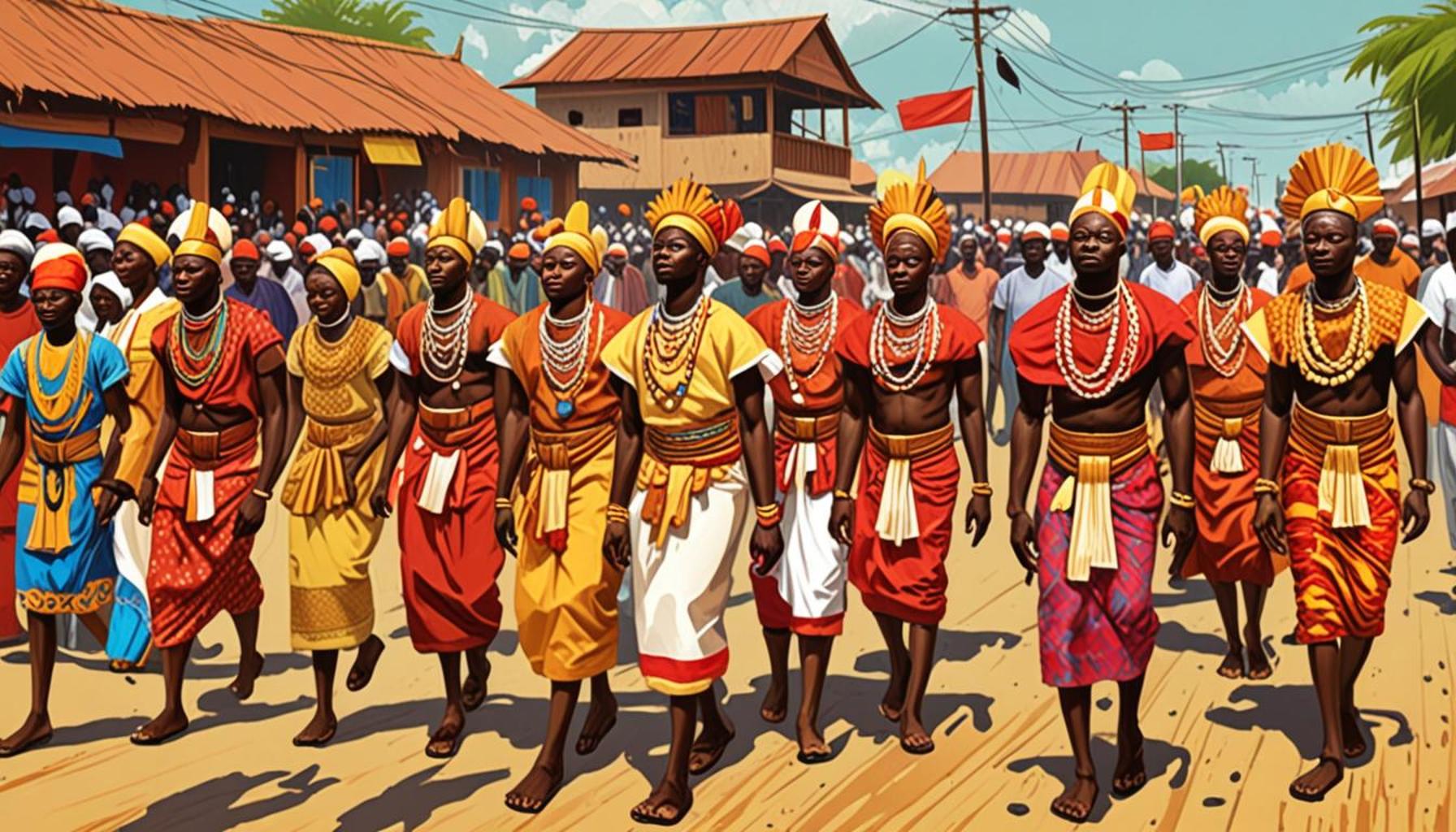Traditional Crafts: Discovering Cultural Jewels in Tourist Itineraries

Unearthing Cultural Gems
Across Nigeria, traditional crafts serve as a vibrant testament to the nation’s rich heritage. These crafts showcase the incredible talent and creativity of local artisans, illuminating the paths of cultural exploration for tourists. From intricate beadwork to handwoven textiles, each piece tells a unique story that connects the present with the historical past.
What Makes Traditional Crafts Special?
Visitors often seek crafted items that reflect the local culture. Here are some compelling reasons to include traditional crafts in your itinerary:
- Cultural Storytelling: Each craft encapsulates history and tradition, often incorporating symbols and patterns unique to a region. For instance, Adire textiles often feature patterns that tell stories of local myths and events, providing insight into the sociocultural fabric of the Yoruba people.
- Unique Souvenirs: Handmade items present authentic keepsakes that mass-produced goods cannot offer. A carved wooden sculpture might depict the cultural significance of ancestral worship, serving as a distinctive reminder of your journey.
- Support for Local Artisans: Purchasing crafts empowers local communities economically. By buying these items, tourists enable artisans to sustain their craft, fostering the continuation of traditions that have been handed down through generations.
Examples of Traditional Crafts in Nigeria
As you traverse Nigeria, consider exploring these fascinating crafts that epitomize the nation’s artistic identity:
- Adire Textiles: A tie-dye fabric with historical roots in southwestern Nigeria, Adire is often made with indigo dye and intricately designed patterns. Not only does it represent local ingenuity, but it also connects to the cultural rituals of the Yoruba people.
- Okene Pottery: Handcrafted pottery showcasing ancient techniques, this craft involves local clay and traditional firing methods, creating functional and ornamental pieces that reflect the skill of the potters from the Kogi State.
- Kano Beadwork: Exquisite bead designs reflect the cultural diversity of the region, with each color and arrangement telling a story of its own. Beadwork is a critical component of traditional attire, often used in ceremonies and festivals, illustrating the deep-rooted customs of the Hausa-Fulani and other ethnic groups.
By embracing these traditional crafts, tourists can gain deeper insights into the cultural landscapes of Nigeria. Each interaction with local artisans not only enriches the travel experience but also helps preserve these crafts for future generations. Let’s delve into the fascinating world of craftsmanship and discover the cultural jewels waiting to be appreciated.
RECOMMENDED: Check out this similar article
The Essence of Craftsmanship
In Nigeria, traditional crafts are not merely aesthetic expressions; they embody the soul of various ethnic groups and their historical narratives. These crafts, characterized by their unique techniques and rich symbolism, are essential to understanding cultural identities. Tourists venturing into Nigeria’s vibrant markets and workshops often find that these crafts serve as gateways to deeper cultural insights. From the vibrant colors of woven textiles to the delicate details of hand-formed pottery, each craft is a storytelling medium that invites exploration.
Artistry Rooted in Tradition
The beauty of traditional crafts lies in their roots. Creating these items often involves community collaboration, where techniques and styles are passed down through generations. As you examine the intricate beadwork of the Igbo people or the outstanding calabash carvings of the Niger Delta, you’ll uncover histories intertwined with creativity and community life. These artifacts not only showcase artists’ skills but also preserve the enduring legacies of ancient practices.
Why Tourists Should Engage with Traditional Crafts
Incorporating traditional crafts into your travel itinerary offers a wealth of benefits:
- Authentic Experiences: Observing artisans in their workshops provides a firsthand look at the dedication involved in creating each piece. Engaging with the makers themselves encourages a deeper appreciation of the art form while fostering a personal connection with the culture.
- Educational Opportunities: Many workshops offer hands-on experiences where tourists can learn traditional crafting techniques. This immersive approach not only enhances visitors’ understanding of the craft but also empowers local artisans to share their knowledge with a broader audience.
- Preservation of Heritage: By purchasing traditional crafts, travelers contribute to the preservation of cultural heritage. These collectibles serve as reminders of a time-honored craft that might otherwise dwindle in the face of modernization and global trends.
Fostering Cultural Connection
As tourists explore markets scattered across Nigeria—from the expansive Aso Oke stalls in the Yoruba region to the vibrant bazaars in the North—opportunities to connect with artisans abound. Do not just be a passive observer; engage in conversations, ask questions, and learn about the meanings behind the crafts. You’ll discover that each item carries a story, a personal connection to the maker, and a piece of the local community’s heartbeat.
The world of traditional crafts in Nigeria is indeed vast and intricate, holding within it the essence of cultural lines that intertwine through history. By focusing on these artistic treasures in travel itineraries, tourists can foster meaningful exchanges that celebrate the creativity of artisans and the richness of Nigerian heritage. So, the next time you set off on a journey through Nigeria, consider making traditional crafts a highlight of your adventure.
| Advantages | Description |
|---|---|
| Cultural Immersion | Exploring traditional crafts helps tourists connect deeply with local cultures and histories. |
| Supporting Local Artisans | Purchasing handmade crafts encourages economic sustainability in local communities. |
The exploration of traditional crafts offers a unique and enriching experience, allowing travelers to discover the stories behind each artisan’s work. For instance, weaving techniques passed down through generations not only create beautiful textiles but also embody the heritage of a community. By engaging in workshops or viewing demonstrations, tourists gain insights into the meticulous processes that define these cultural jewels.Incorporating traditional crafts into tourist itineraries is not just about sightseeing; it’s about embracing the authenticity of the places visited. Every item crafted carries with it a narrative, making each purchase a souvenir of precious memories. Furthermore, this approach highlights the importance of preservation in our interconnected world, as many crafts face extinction in the face of globalization.As interest in sustainable tourism grows, travelers are more inclined to seek out experiences that contribute positively to local communities. Participating in and supporting traditional crafts ensures that these artisan skills continue to thrive, offering a brighter future for cultural legacies worldwide. Engage with these artistic practices and contribute to the revival of artisanship while experiencing the heart of local traditions.
CHECK OUT: Click here to explore more
Exploring Local Markets: A Treasure Trove of Traditional Crafts
Nigeria’s local markets are dynamic spaces where traditional crafts come to life, showcasing the vibrant cultures that exist within the country. These markets, such as the famous Zaki Biam Market in Benue State or the bustling Balogun Market in Lagos, serve as melting pots of craftsmanship, where tourists can encounter unique products ranging from handwoven baskets to intricately designed metalwork.
Artisan Spotlights: The Masters Behind the Crafts
One of the most enriching experiences a tourist can have is meeting the artisans themselves. Each craftsperson often specializes in a particular technique that has been honed over years, if not decades. For instance, visiting a traditional pottery workshop in the northern regions allows you to see how artisans create beautiful clay pots, each one unique and used in various cultural rituals. Engaging with artisans opens a window to understanding their personal narratives and the motivations behind their artistry.
The Role of Craft in Sustainable Tourism
Incorporating traditional crafts into tourist itineraries also promotes sustainable tourism. By purchasing handmade items directly from artisans, tourists contribute to their livelihoods. This not only supports local economies but also ensures that the art forms continue to thrive. Many artisans use locally sourced materials, further embedding eco-friendly practices into their work. For example, the use of indigenous woods for carving or the natural dyes derived from plants embodies a commitment to preserving the environment while keeping tradition alive.
Festivals: A Celebration of Craftsmanship
Events like the Osun-Osogbo Festival and the Art and Culture Festival in Lagos serve as platforms for traditional crafts to shine. These festivals not only celebrate local artisans but also attract tourists eager to experience the rich cultural practices of Nigeria. During these occasions, craft booths line the streets, offering everything from beautiful masquerade costumes to intricate jewelry. Tourists have the chance to watch demonstrations, participate in workshops, and witness live crafting exhibitions that celebrate the diversity of Nigeria’s cultural heritage.
Potential Challenges and Opportunities
Despite the importance of traditional crafts, artisans face challenges such as globalization and mass production, which threaten the survival of these art forms. However, awareness is growing among tourists, leading to greater curiosity and respect for authentic, handmade products. As travelers become more intentional about the souvenirs they purchase, there is a notable shift towards valuing craftsmanship over commercialism. This presents an opportunity for artisans to not only showcase their work but also educate visitors about the cultural significance embedded in each piece.
When planning travels through Nigeria, enriching itineraries with visits to local markets, artisan workshops, and cultural festivals allows for an authentic engagement with the traditional crafts that define the country’s cultural landscape. By weaving traditional artistry into the travel experience, tourists can truly appreciate the diversity and heritage of Nigeria while contributing to the continuity of these cultural treasures.
RECOMMENDED: Check out this similar article
Conclusion: Embracing the Essence of Traditional Crafts
In an age where mass production often overshadows individuality, the exploration of traditional crafts offers a refreshing opportunity to reconnect with the heart and soul of a culture. From the spirited paths of Zaki Biam Market to the engaging narratives found in artisan workshops across Nigeria, tourists are invited to embark on a journey that transcends mere sightseeing. By immersing themselves in these cultural treasures, travelers not only gain a deeper understanding of the artistic techniques that define Nigeria’s rich heritage but also support the artisans who preserve these age-old traditions.
The interplay between tourism and traditional craftsmanship is not just about acquiring a unique souvenir but is also about fostering sustainable practices that empower communities. Through intentional acts of purchasing handmade items, visitors contribute to local economies and stimulate a resurgence of interest in indigenous artworks. Moreover, festivals like Osun-Osogbo highlight the dynamic relationship between celebration and craftsmanship, showcasing the vibrancy of traditional arts that deserve recognition on both local and global stages.
As you plan your next adventure, consider integrating visits to local artisans into your itinerary. This choice allows for an authentic interaction that fosters appreciation for Nigeria’s cultural diversity. In celebrating these cultural jewels, both tourists and artisans participate in a shared narrative: a legacy of creativity, resilience, and cultural pride that transcends generations. The journey to discover traditional crafts not only enriches the travel experience but also plays a crucial role in safeguarding these invaluable art forms for future generations.


